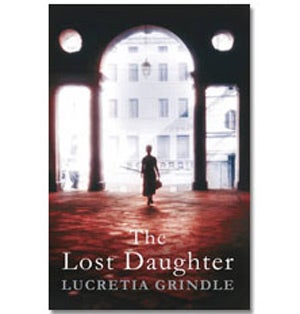The Monday Book: The Lost Daughter by Lucretia Grindle
Fact meets fiction in a taut thriller

Your support helps us to tell the story
From reproductive rights to climate change to Big Tech, The Independent is on the ground when the story is developing. Whether it's investigating the financials of Elon Musk's pro-Trump PAC or producing our latest documentary, 'The A Word', which shines a light on the American women fighting for reproductive rights, we know how important it is to parse out the facts from the messaging.
At such a critical moment in US history, we need reporters on the ground. Your donation allows us to keep sending journalists to speak to both sides of the story.
The Independent is trusted by Americans across the entire political spectrum. And unlike many other quality news outlets, we choose not to lock Americans out of our reporting and analysis with paywalls. We believe quality journalism should be available to everyone, paid for by those who can afford it.
Your support makes all the difference.Lucretia Grindle is an ambitious writer. Her novel The Villa Triste expanded a boy-girl romance into a vision of Italian resistance during the Second World War.
Now she turns her attention to the 1970s, era of the Red Brigades' terrorist attacks in Italy, and their infamous acts of kidnapping and murder. A strong suspense element is provided at the start of The Lost Daughter by a modern kidnapping. The spoilt daughter of a rich American vanishes from the street. Detective Enzo Saenz, a humane man who enjoys the ordinary pleasures of the Italian male, and his boss, the withdrawn and intellectual Pallioti, suspect there is something strange about the girl's stepmother.
She indeed proves the key to the case, for "Anna Carso" began life as Angela Vari, a butcher's daughter from Ferrara. In that small town, just beginning in the Seventies to accommodate the modern world, she encounters a sinister, sexy young politico who abandons her after a casual relationship.
Antonio goes on to become the leader of a Red Brigade and finds that now Angela can be useful to him. He ruthlessly co-opts her to cook and wash for an important prisoner: none other than Aldo Moro, leader of the Christian Democrats. Moro is to be put "on trial". Inevitably, the kangaroo court sentences him to death. Angela grows to have a rapport with the prisoner, even, in a reversal of the Stockholm syndrome, an affection for him. But she cannot prevent his murder.
This is the point at which romance and history meet. Historical fact decrees that Moro died, yet Grindle has to keep the reader's sympathy for her fictional Anna, who could have saved him. Anna does in fact give evidence, too late to save Moro, but soon enough to convince us that she is a woman of conscience and compassion.
Having convincingly negotiated this marriage of fact and fiction, the story returns to the present-day kidnapping. Here the suspense is cleverly increased with an extra turn of the screw involving a determined woman lawyer, a long-time friend of Angela's. Grindle throws in bags of atmosphere with her loving descriptions of life in an Italy undergoing painful social upheaval, effectively symbolised by the Varis' butcher's shop, where expert filleting must give way before the irresistible advent of pre-packed supermarket chicken. Yet not all Italians lose their true values: at the end, the lawyer still believes in the fundamental principles of justice, even for a terrorist.
Join our commenting forum
Join thought-provoking conversations, follow other Independent readers and see their replies
Comments